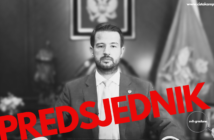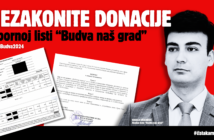Source: ID Vijesti (Željka Vučinić)
Current course of the pre-election campaign for local elections shows that political parties, including those that criticized such practices of the former DPS’ government, use mechanisms to influence voters that can be considered abuse. The Director of the MANS Investigative Centre, Dejan Milovac, assessed this for “Vijesti”, stating that one of those abuses is the so-called institutional advantage, i.e. the so-called officials’ campaign.
During it, as the interlocutor explains, a political party makes an attempt to take credit for existing or future projects. Those projects, he states, are normally financed with the money of all citizens, “even those who will not vote for that political option”.
In that tone was also the recent remark of the leader of the URA list from Bjelo Polje “Može Bijelo Polje, može Crna Gora”, Suada Zoronjić, who stated that the Government and the Prime Minister, who is her party colleague, are ready to invest one million euros into a large project of equipping the heating plant in residential part of Rasadnik settlement.
“By equipping the heating room/heating plant in Rasadnik, the conditions would be created to turn the area between the buildings into a functional space, which would be an element that improves the quality of life for over 200 apartments. That will be one of the important projects that we plan to implement, for which the Government of Montenegro and its Prime Minister Dritan Abazović are ready to allocate one million euros”, Zoronjić said.
At the beginning of October, a similar promise was made by the Mayor of Podgorica and the leader of the DPS coalition “Svi za naš grad”, Ivan Vuković, when he said that the Capital City, if the government failed to help, would allocate funds for the construction of a fourth building for pensioners. As stated in the DPS’ press release, Vuković said this at a gathering of candidates for councillors of that coalition with elderly citizens of Podgorica, on the occasion of October 1, the International Day of Older Persons.
According to information obtained by “Vijesti”, the gathering was held in the “Ognjište” restaurant in Gornja Gorica, and was attended by DPS’ activists in pensioners’ associations. The list “Za budućnost Bara – Maja Vukićević” criticized the mayor of that town, Dušan Raičević (DPS), for “protecting a private company and the controversial financier of DPS in the eve local elections”.
Namely, Raičević decided to visit the private estate of the Bar oil factory, which is owned, as stated, by a controversial businessman and years-long financier of DPS – both at the local and state level, and that he not only insulted all hard-working olive growers who live from that business, but also publicly and directly expanded this private enterprise.
Milovac assessed that the institutional advantage is only a part of the mechanisms that, in the eve of the next elections, “was taken over by the new political majority that now has access to such opportunities, and the continuation of their use is a direct consequence of the lack of political will to change things systematically, i.e. to start a serious and comprehensive reform of electoral legislation”.
“There is no doubt that the perception of the once opposition parties has changed by taking over the power, and that there is a complete normalization of bad electoral practice. This has already happened with the so-called pre-election employment and the abuse of social assistance to the extent that on the political scene, we hardly have any political entity that could have the credibility to accuse the previous regime, i.e. dominantly DPS, of any violation of the law in this area, because they behave in an identical way”, Milovac said.
He pointed out that this is also one of the key obstacles for the electoral reform and most likely the main reason why almost no one is interested in its implementation in due time. The standards of the Organization for Security and Co-operation in Europe (OSCE) stipulate that current candidates and parties may not use state funds or resources in the pre-election campaign.
OSCE standards stipulate that participating states shall ensure “a clear separation between the state and political parties – in particular, political parties will not be merged with the state.” “The use or “abuse” of state resources has become a very problematic area in many states during elections and is contrary to the principle of equal treatment of candidates and political parties. While there is a natural and unavoidable incumbency advantage, legislation on political finance must be careful to not perpetuate or enhance such advantages”, previously issued instructions of the OSCE state.
They note that current candidates and parties may not use state funds or resources, i.e. materials, employment contracts, transportation, employees and similar state funds for their own benefit. This did not prevent the representatives of the former government, especially during earlier election cycles ahead of the 2020 parliamentary and 2018 local elections, from using their positions for pre-election purposes.
Among the examples is when, in the eve of the 2020 parliamentary elections, the President of the country, Milo Đukanović, and the then first man of the Parliament of Montenegro, Ivan Brajović, actively participated in the election campaign, simultaneously using their state and political positions. In 2018, in the eve of the local elections in Berane, the then Prime Minister and DPS official Duško Marković visited that town with the Minister of Economy and the director of the Investment and Development Fund, and promised support for the work of businessmen in Berane.
The representatives of the opposition parties pointed out that in 2018, the then Minister of Agriculture Milutin Simović (DPS) was directly involved in the campaign of the party in power in Bar, giving loans to the voters of that party before the local elections.
In the eve of the elections, state institutions breaking the law once again, the Employment Agency of Montenegro ZZZCG spent one million euros more than allowed
MANS’ analysis shows that several state institutions violate the limit on the use of budget funds during the election campaign. On that occasion, today, MANS will submit to the Agency for Prevention of Corruption initiatives for the initiation of proceedings for violations of the Law on Financing of Political Entities and Election Campaigns.
As stated, the Employment Agency is leading among the institutions, which spent 1.1 million euros more than the six-month average in August. According to them, the Ministry of the Interior spent 500,000 euros more than the monthly average in the same month, and the biggest increase in spending in the month when the local elections were announced was for the item net salary.
According to them, the Ministry of Defence spent 200,000 more than the monthly average in August, while the Parliament exceeded the average monthly spending by around 100,000 euros, as well as the Administration for Food Safety, Veterinary and Phytosanitary Affairs, which exceeded the legal limit by 117,000 euros.



